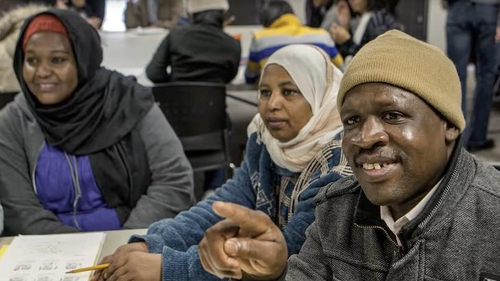Your Guide to College and University in the United States

For many adjusting to life in the United States, continuing your education after high school can be a powerful step toward a bright future. But the U.S. school system can seem new and confusing.
This guide is designed to help you understand your educational options so you can take the next step with confidence.
Learning After High School
In the United States, many choose to continue their studies after they finish high school. This is often called “going to college” or “attending university.” These schools give you the chance to learn new skills, prepare for a specific career, or study a subject you are passionate about.
The general term for all education that takes place after high school is “higher education.” This guide will help you understand the different paths you can take.
Finding the Right School for You
There are two main types of schools that welcome students after high school, each serving a different purpose.
Community colleges are often an excellent and affordable starting point. These local schools offer two-year programs where students can earn an associate degree. Many students attend a community college for their first two years and then transfer to a four-year university to complete a bachelor's degree. This path could significantly reduce the overall cost of an education. Community colleges are also known for offering career-focused programs that provide training for specific jobs.
Four-Year Colleges and Universities offer bachelor's degrees, which typically take four years to complete. Universities are usually larger schools that also offer advanced degrees, such as master's or doctoral degrees, for students who have already completed a bachelor's degree. These schools often have a vibrant campus life with student housing, clubs, and numerous activities.
How to Apply
The process of applying to a school, often called "admissions," is different for each institution. It is important to visit the website of any college you are interested in to see its specific requirements.
Most applications will require:
- An application form with your personal and educational background.
- Your official school records (transcripts) from high school.
- A personal essay, which is your opportunity to share your story and goals.
- Letters of recommendation from teachers or mentors who know you well.
Help is available. School counselors and community mentors can provide valuable support during the application process.
Paying for Your Education: What You Need to Know
While the cost of college in the U.S. can be expensive, it should not hold you back. Financial assistance, known as financial aid, is available to help students pay for their schooling. While this aid can be limited, many options exist to help you.
This aid comes in two primary forms:
- Scholarships and grants: This is money for your education that you do not have to pay back. Many organizations and colleges offer scholarships specifically for newcomers, refugees, or asylees. Some schools have dedicated scholarships for displaced students that can cover the full cost of tuition and even assist with living expenses. It is important to research and apply for these early.
- Loans: This is money that is borrowed and must be paid back over time with an added fee (interest).
Every college has a financial aid office staffed with professionals whose job is to help students find funding. Refugees and asylees may also be eligible for specific federal assistance through the Office of Refugee Resettlement (ORR).


